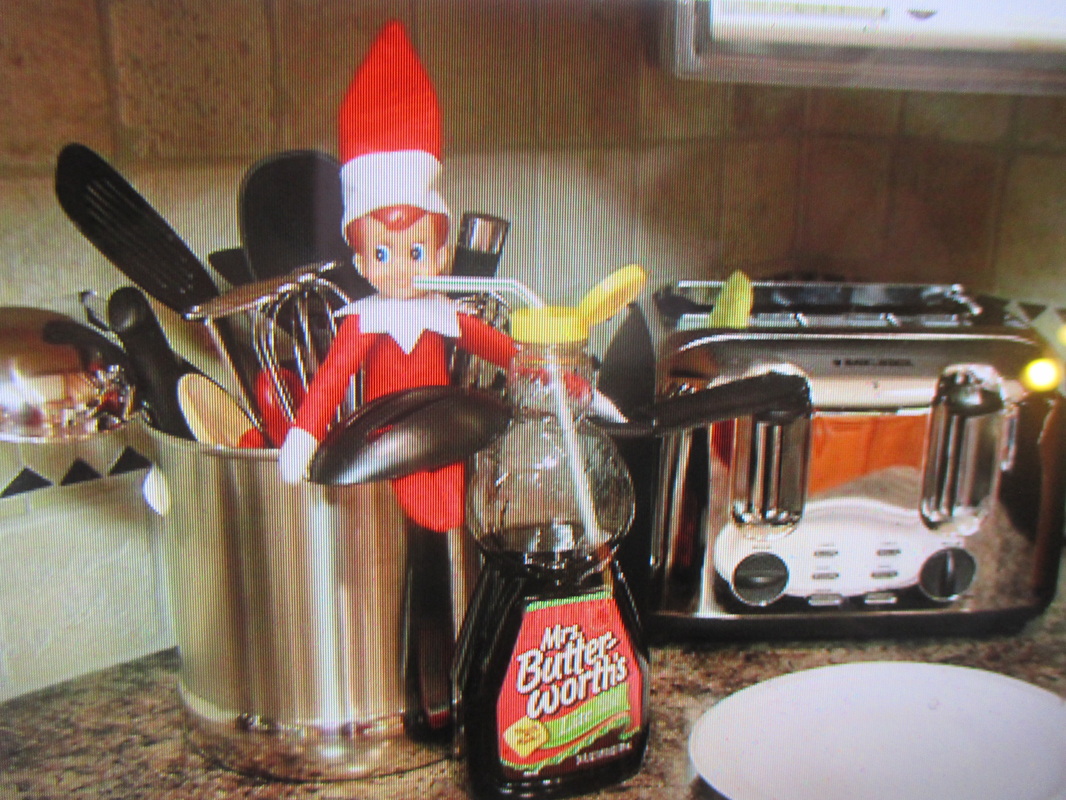|
Last night I heard kind of an awful story, told to me by one of my 6-year-old piano students. When young students are sitting next to me on the piano bench they do have a propensity for spontaneously sharing whatever thought is currently running though their young minds at any given moment. At this time of year much of the chat is about Christmas, and they especially love talking about their elf-on-the-shelf, telling me about some of the funny places their elf has recently shown up and showing me where their elf currently is. Some of them like me to walk around the room and find their elf, which I do with much drama and delight when I finally spot the elf, which I'm always careful not to do too quickly. I can't imagine that there are many folks out there who don't know what an elf-on-the-shelf is, but for the uninitiated it's a bendable elf doll whom the children believe is a real elf sent from Santa. One day around Christmas time the elf will just up somewhere in the house and every year children wait with excitement for their elf to show up for the first time. Every day the elf shows up in a different spot around the house and the children have to search for him every morning, which they love doing. On Christmas day the elf flys back up to Santa and will re-appear the next year.
I'm guessing that children believe in their elves as long as they believe in Santa. The one rule about the elf-on-the-shelf, as my young students are always reminding me, is that no one may touch it. If anyone touches the elf it loses its magic, though no one ever explained exactly what that might entail. Until last night. Anyway, last night my young student began chatting on the subject of elves-on-the-shelf. It occurred to me that this was the first time this child had ever mentioned the subject and had never mentioned having an elf of their own. So I asked them if they had an elf-on-the-shelf. The child became suddenly serious and shook their head, telling me that they weren't allowed to have one because last year when their mother took them over to a friend's house the friend was too upset to play because a boy had come over and touched the friend's elf-on-the shelf on purpose. "What happens when you touch an elf on the shelf" I asked. "It loses its magic and flies up to Santa and never comes back," the child answered somberly. "Is that what happened to your friend's elf?" I asked. The child nodded. "So we had to go home and my mom said, 'we're not doing that!'" And that was the end of the story. My little piano student seemed none the worse for telling it and hopped right back into the lesson. But I found the story troubling. For the rest of the lesson I couldn't stop thinking about the poor child whose elf-on-the-shelf had to fly away because some mean boy touched it on purpose. And now I'm wondering - is that what parents actually do if the elf gets touched? They take it away and tell their kids that it lost its magic and flew back to Santa and is never coming back? I mean, was the mother of that one kid an outlier or is that what parents do to their kids over these elf dolls? And if so, why? I mean, what's the point? Yesterday before I learned of the the elf incident one of my daughters just coincidentally happened to make the comment on my facebook timeline that if elf-on-the-shelf had been around when she and her sibs were young and if they'd wanted one I probably would have made one for them. This is true. Artisanal parent that I was, (see posts from 11/4/2014 and 11/5/2014) I tended to make things rather than buy them. I sewed Cabbage Patch dolls for them which, of course, didn't look as good as store-bought, and when somebody wanted an E.T. doll I sewed one from an old sock, which also didn't look all that much like E.T. Thankfully, kids have imaginations. So if they'd wanted one I probably would have made them a decidedly second-rate-looking elf-on-the-shelf, too. But their elf-on-the-shelf wouldn't have had any magic powers and wouldn't have flown back to Santa and if someone touched their elf nothing bad would have happened. I wouldn't have had the heart for it.
4 Comments
Romaine
12/11/2014 03:17:27 am
I think there should be a rule that if you purposely try to take away another person's elf's magic - then it should backfire and happen to your own elf instead.
Reply
Patti
12/11/2014 10:55:07 am
Yes, that would be a good rule!
Reply
Claire
12/11/2014 07:05:23 am
Maybe the elf parents were tired of moving the elf around, so it was easier to have the elf fly away. I've heard of elves that regain their power the next day, if they were touched accidentally. This works too if the elf falls off his shelf, someone has to grab him to save him from the dog.
Reply
Da Horse Lover
12/21/2015 02:08:58 pm
My little sister ( who is 5 years old) tried to touch my elf Daisy but she didn't succeed in the process because the elf was way too high up and my Russian aunt was there but didn't know that your not aloud to touch an elf on the shelf and so she did what my little sister said and put her someplace she could reach it, but before she could touch it mom and I came home from school and I caught her right in nick the of time. the point of this comment though is my Russian aunt touched her without even knowing that she wasn't supposed to touch her, what will happen?
Reply
Leave a Reply. |
"Tropical Depression"
by Patti Liszkay Buy it on Amazon: https://www.amazon.com/dp/B0BTPN7NYY "Equal And Opposite Reactions"
by Patti Liszkay Buy it on Amazon: http://amzn.to/2xvcgRa or from The Book Loft of German Village, Columbus, Ohio Or check it out at the Columbus Metropolitan Library
Archives
July 2024
I am a traveler just visiting this planet and reporting various and sundry observations,
hopefully of interest to my fellow travelers. Categories |







 RSS Feed
RSS Feed